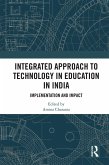The volume examines diverse learning approaches such as assistive technology and augmentative and alternative communication for learners with disabilities and creating more social and accessible environments for learning through Collaborative Learning Techniques (CoLTS), massive open online courses (MOOCs), and the use of AI (Artificial Intelligence) in modern classrooms. Enriched with discussions on recent trends in ET (Education Technology), university curriculum and syllabi, and real-life examples of the use of ET in different classroom settings, the book captures diverse aspects of education technology and its potential. It also discusses the challenges of making technology and resources available for all and highlights the impact technology has had in classrooms across the world during the COVID-19 pandemic.
This book will be of interest to students, researchers, and teachers of education, digital education, education technology, and information technology. The book will also be useful for policymakers, educationalists, instructional designers, and educational institutions.
Dieser Download kann aus rechtlichen Gründen nur mit Rechnungsadresse in A, B, BG, CY, CZ, D, DK, EW, E, FIN, F, GR, HR, H, IRL, I, LT, L, LR, M, NL, PL, P, R, S, SLO, SK ausgeliefert werden.









